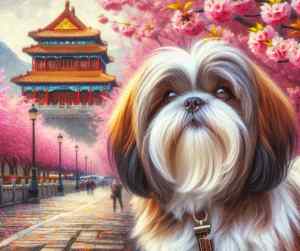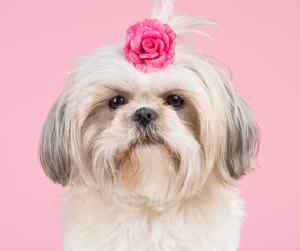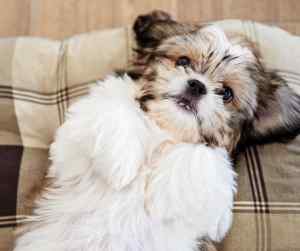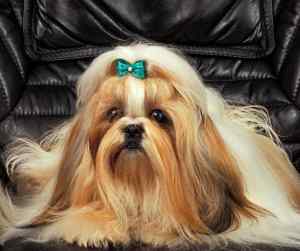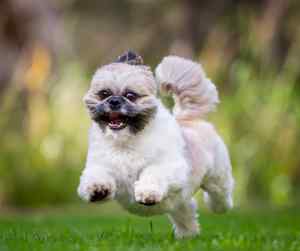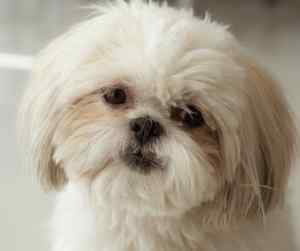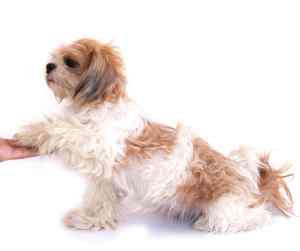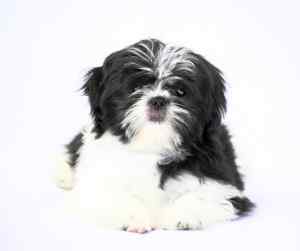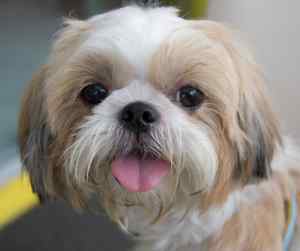The Shih Tzu Extravaganza: Everything You Need to Know About This Royal Canine Breed
From their regal ancestry to their playful personalities, let us unravel the fascinating world of Shih Tzu dogs. These fluffy companions are more than just pretty faces – they are loving, intelligent, and full of surprises!
Indulge in an entertaining journey through the world of Shih Tzu dogs. Discover their rich history, breed traits, health concerns, and grooming needs. Plus, learn why they make perfect pets for all types of families.”
Welcome to the fabulous world of Shih Tzus! Here’s a small dog breed that takes the term “lap dog” to a whole new level. These little guys were practically bred to be the perfect companions for Chinese royalty, and they haven’t forgotten their roots. So strap in, because we’re about to dive into the high-class, fancy world of the Shih Tzu.
Quick Facts About Shih Tzus
- Country of Origin: China (Tibet)
- Breed Classification: Toy Dog Breeds
- Size: Small dogs ; typically 9-10.5 inches (23-27 cm) in height and 9-16 pounds (4-7 kg) in weight
- Physical Characteristics: Compact body, flat face, large dark eyes, long flowing double coat, curled tail
- Lifespan: 10-16 years
- Average Cost: $500-$1,500 (higher for show-quality dogs)
- Allergenic Properties: Low shedding; hypoallergenic, but requires regular grooming
- Compatibility with Children: Good; generally affectionate and gentle with children
- Compatibility with Other Pets: Generally good; social and friendly with other pets
- Health Issues: Prone to brachycephalic syndrome (breathing problems), hip dysplasia, patellar luxation, ear infections, and dental issues
- Trainability: Moderate; can be stubborn but responds well to positive reinforcement
- Grooming Needs: High; daily brushing to prevent matting, regular trimming, and eye care
- Exercise Requirements: Low; short daily walks and playtime indoors are usually sufficient
Popular Shih Tzu Hybrid/Designer Breeds:
Shih Tzus are known for their affectionate, friendly, and alert temperament, making them excellent companion dogs.
History of the Shih Tzu: From Ancient Palaces to Modern Homes
The Shih Tzu, often referred to as the “lion dog” and known for its distinctive, flowing coat, traces its origins back to ancient China. This small yet sturdy breed has a rich history that spans over a thousand years, with the dog being a favored companion of the emperors of China and later a beloved pet in homes around the globe.
The Shih Tzu’s history begins in the palaces of ancient Chinese royalty. The breed was likely developed by crossing the Lhasa Apso from Tibet and the Pekingese from China. The dogs were loved by the royal families and were often seen in their laps or following closely behind them. They were treated as royal members and were often given their own servants. It is also believed that the dogs were bred to resemble the images of lions, which are a sacred symbol in Buddhism.
During the Tang Dynasty, around 618 to 907 AD, breeding of these “lion dogs” became increasingly popular. They were often gifted to foreign dignitaries as a sign of respect and honor. The breed continued to be cherished throughout the Ming (1368 to 1644) and Manchu (1644 to 1912) Dynasties, with the royal families often commissioning portraits of their favorite pets.
However, after the fall of the Chinese imperial rule in 1912, the breed suffered a steep decline. Many of the royal dogs were lost or killed, and the breed was nearly driven to extinction.
The Shih Tzu’s journey to the Western world began in the 1920s and 1930s. The first pair of Shih Tzus was brought to England by Lady Brownrigg, the wife of the then British high commissioner to China. She started breeding them and the popularity of the breed started to grow. The breed was recognized by the Kennel Club (England) in 1946 and by the American Kennel Club in 1969.
During the second half of the 20th century, the Shih Tzu became increasingly popular in American households. Their small size, friendly nature, and beautiful coat made them a favorite among families, and they were often portrayed in media as the ideal lap dog.
Today, the Shih Tzu ranks as one of the most popular dog breeds worldwide. They are known for their affectionate nature, playful demeanor, and their ability to adapt to different living conditions, making them a favorite choice for both apartment living and in homes with yards.
In conclusion, from the palaces of ancient China to modern homes around the globe, the Shih Tzu’s history is full of ups and downs. Despite the breed’s near extinction, the love and admiration for these “lion dogs” have persisted through the centuries, making them one of the most beloved breeds today. Their history is a testament to their resilience and enduring charm.
You can learn more about their fascinating lineage here.
Shih-Tzu Appearance
Shih Tzus are a small toy dog breed known for their beautiful and distinctive appearance. They typically weigh between 9 to 16 pounds and stand about 8 to 11 inches tall at the shoulder. Their bodies are slightly longer than they are tall, giving them a somewhat rectangular shape.
One of the most noticeable features of a Shih Tzu is their luxurious and long double coat, which comes in a wide variety of colors and patterns. The coat colors can range from black, white, blue, gold, silver, brindle, and various combinations of these colors. Some Shih Tzus have a solid color while others have a combination of two or more colors. The coat can be kept long for show dogs, or it can be trimmed shorter for easier maintenance.
Their heads are round and broad, with large, round, very dark eyes that have an alert and warm expression. Their ears are large and droopy, covered in hair that blends in with the coat on their body. The hair on the top of their head is often grown long and tied in a topknot to keep it out of their eyes.
The Shih Tzu’s nose is short and broad, often a bit darker in color than the rest of their fur. Because of their short noses, they are a brachycephalic breed, which can sometimes lead to breathing issues.
They have a strong, muscular neck and sturdy, well-boned legs. Their tail is high-set and is covered in dense fur that curls over the back. The tail typically curls over and rests on the dog’s back, and it wags back and forth when they are happy or excited.
Overall, the Shih Tzu’s appearance is one of elegance and charm, with their flowing coat and unique facial features making them stand out in any crowd. Despite their small size, they carry themselves with an air of nobility and grandeur.
Unique Shih Tzu Personality Traits: A Blend of Royal and Playful
Shih Tzus are unique dogs that have a captivating blend of royal and playful personality traits. In this article, we will explore the unique Shih Tzu personality traits that make them one of the most loved breeds around the world.
1. Royal Demeanor: Shih Tzus were bred to be royal dogs in ancient China, and this royal heritage is still apparent in their dignified and regal demeanor. They carry themselves with an air of royalty, always holding their heads high and strutting around with confidence. They have a sense of self-importance and demand respect, just like a true royal.
2. Playful and Lively: Despite their royal demeanor, Shih Tzus are extremely playful and lively. They love to play games and are always up for a fun time. Their playful nature makes them favorite companions for both children and adults. They can keep you entertained for hours with their playful antics.
3. Affectionate and Loving: Shih Tzus are known for their affectionate nature. They love to cuddle and are always seeking attention from their owners. They tend to form strong bonds with their human family and thrive on love and affection.
4. Alert and Intelligent: Shih Tzus are very alert and intelligent dogs. They are quick to pick up on things and are always aware of their surroundings. This trait makes them excellent watchdogs as they can quickly sense any disturbance and alert their owners.
5. Stubborn yet Adaptable: Shih Tzus can be a bit stubborn at times, but this is usually balanced by their adaptable nature. They may have a mind of their own, but they are also quick to adjust to new situations and environments.
6. Sociable and Friendly: Shih Tzus love to socialize and are generally friendly with everyone they meet. They are not shy or aggressive and enjoy being in the company of both humans and other dogs.
7. Energetic yet Calm: Shih Tzus are energetic dogs that love to play and explore. However, they also know when to calm down and relax. They can spend hours playing but also enjoy lounging around the house.
These unique personality traits make Shih Tzus a blend of royal and playful, making them perfect family pets. Whether they are strutting around like a royal or amusing you with their playful antics, Shih Tzus are sure to win your heart with their charming personalities.
Don’t let their regal history fool you; Shih Tzus are far from snobbish. These dogs are known for their friendly, outgoing, and playful nature. They love attention and will often perform tricks to get it. Plus, they are great with kids and other pets. It’s like having a little jester in your home who also doubles as a cuddle buddy.
Caring For Your Shih Tzu Dog
Shih Tzu dogs are known for their adorable appearance and friendly nature. They are small, but have a big personality and are full of energy. Caring for your Shih Tzu involves consistent grooming, regular exercise, and a balanced diet to ensure their overall health and happiness.
Grooming Shih Tzu Dogs – An Important Commitment
Grooming Shih Tzu dogs is an important commitment that should not be undertaken lightly. This breed has a luxurious double coat that requires regular maintenance to ensure that it remains healthy and attractive. Here’s a detailed expansion on what the commitment entails.
1. Regular Brushing: Shih Tzu dogs need to be brushed daily to avoid knotting and tangling of their long hair. This can be a time-consuming process, but it’s essential in maintaining the health of their coat. Brushing also helps to distribute natural oils, promoting a shiny and healthier coat.
2. Bathing: Bathing a Shih Tzu should be done every three to four weeks. Using a high-quality dog shampoo will help to maintain the health of their skin and coat. It’s also necessary to thoroughly rinse and dry them afterward to prevent skin irritation.
3. Haircuts: Depending on the style you prefer, your Shih Tzu may require frequent haircuts. Some owners prefer a shorter “puppy cut,” while others maintain the traditional long-haired look. Whichever style you choose, regular trips to a professional groomer will be necessary.
4. Ear Care: The Shih Tzu’s ears can be prone to infections due to their size and shape. Regular cleaning and checking for signs of infection are crucial parts of their grooming routine.
5. Nail Trimming: Just like other breeds, Shih Tzus require regular nail trims. If their nails get too long, it can cause them discomfort and can even affect their ability to walk properly.
6. Dental Care: Shih Tzus are also prone to dental problems, so regular brushing of their teeth is essential to prevent plaque buildup and gum disease.
7. Eye Care: This breed often suffers from eye issues, so regular cleaning and monitoring are needed.
8. Regular Check-ups: Routine vet check-ups are part of the grooming process, as the vet can spot potential health issues and provide necessary vaccinations.
In conclusion, grooming a Shih Tzu is a significant commitment, requiring time, patience, and a degree of expertise. However, this commitment is rewarded with a healthy, happy, and beautiful pet.
Shih Tzu Exercise Needs
Shih Tzus are small dogs that are known for their friendly and outgoing nature. Like all dogs, they also require regular exercise to stay healthy both physically and mentally. However, unlike larger breeds, Shih Tzus don’t demand as much exercise.
Typically, a Shih Tzu requires about 20-30 minutes of exercise per day. This can be in the form of short walks, light playtime, or even indoor games. Shih Tzus are not built for intense exercise or long runs as they are a brachycephalic breed, meaning they have a short nose and flat face, which can cause breathing problems if they overexert themselves.
Regular exercise can help a Shih Tzu maintain a healthy weight, as they can easily become overweight if they don’t get enough physical activity. Exercise also helps to keep their joints flexible and can prevent health issues such as heart disease.
When exercising your Shih Tzu, it’s important to remember that they can overheat easily due to their thick double coat. So, try to avoid exercising them during the hottest parts of the day and always provide plenty of water.
They are adaptable dogs and can adjust to living in an apartment as long as they get their daily exercise. However, they also enjoy having a yard to explore. Most Shih Tzus also enjoy playing with toys, which can be a great way to provide mental stimulation as well as physical exercise.
It’s also important to remember that Shih Tzus are sociable animals and they enjoy being around their human family. They will be much more likely to engage in playtime and exercise if you are involved.
Overall, while Shih Tzus do require regular exercise to stay healthy, their needs are less demanding than many other breeds. They are happy with short, frequent bouts of activity and plenty of time spent in their owner’s company.
Shih Tzu Mental Health and Stimulation Needs
Shih Tzus are a popular breed known for their friendly and affectionate nature. They are small, but they have big personalities and require proper mental health and stimulation to live a happy and healthy life. Here’s an expansion of the Shih Tzu’s mental health and stimulation needs:
1. Social Interaction: Shih Tzus are highly social animals that thrive on interaction with their human families. They love to be part of the family activities and enjoy spending time with their owners. This social interaction is key to their mental health and wellbeing.
2. Training: Training provides mental stimulation for Shih Tzus. They are bright dogs that enjoy learning new commands and tricks. Regular training sessions can help keep their minds sharp and engaged.
3. Playtime: Regular play sessions are important for a Shih Tzu’s mental health. They enjoy interactive toys and games that challenge them mentally. Puzzle toys, for example, can keep them engaged and provide mental stimulation.
4. Regular Exercise: While Shih Tzus are not as active as some other breeds, they still need regular exercise to keep them physically and mentally healthy. Regular walks, play sessions in the yard, or indoor games can help meet their exercise needs.
5. Socialization: Socialization is crucial for a Shih Tzu’s mental health. Meeting other dogs, people, and experiencing new environments can help prevent anxiety and fear-based behavior.
6. Mental Stimulation Toys: Toys that require problem-solving, like food-dispensing toys or puzzle toys, can provide mental stimulation for a Shih Tzu. These toys can keep them busy and challenge their minds.
7. Companionship: Shih Tzus don’t do well when left alone for long periods. They can become anxious and show destructive behavior. Having a companion, whether human or another pet, can help to alleviate this anxiety.
8. Routine: Shih Tzus thrive on routine. A consistent schedule for meals, walks, and playtime can help them feel secure and prevent anxiety.
9. Positive Reinforcement: Shih Tzus respond well to positive reinforcement. Rewarding them for good behavior can boost their confidence and contribute to their mental health.
10. Avoidance of Stressful Situations: Shih Tzus can be sensitive to stress. Try to avoid exposing them to loud noises, large crowds, or other stressful situations. If unavoidable, there are calming aids available like anxiety wraps or calming sprays.
All these factors contribute to the overall mental health and stimulation needs of a Shih Tzu. It is important to understand and meet these needs to ensure your Shih Tzu lives a happy and fulfilling life.
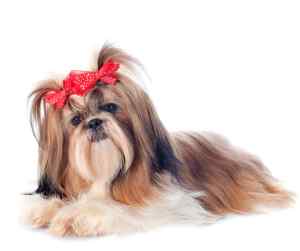
Shih Tzu Nutrition – How and What to Feed Your Dog
Shih Tzu, known for their playful and friendly nature, are small dog breeds that require special care and attention, especially when it comes to their nutrition. Ensuring that your Shih Tzu gets the right nutrition is crucial to its health and overall well-being. Here are some insights on how and what to feed your Shih Tzu:
1. Balanced Diet : Shih Tzu dogs require a balanced diet that includes carbohydrates, proteins, fats, vitamins, and minerals. These nutrients can be found in high-quality commercial dog foods. The American Kennel Club recommends food that contains a good source of animal protein such as chicken, beef, fish or lamb, and complex carbohydrates like sweet potatoes or brown rice. Fruits, vegetables, and grains can offer the necessary vitamins and minerals.
2. Feeding Schedule: Shih Tzus should be fed based on their age, size, and activity level. Puppies (3 to 6 months old) may need to be fed three to four times a day, while adults (1 year onwards) can be fed twice a day. It’s important to maintain a regular feeding schedule to avoid overeating and obesity.
3. Portion Size: The quantity of food should be strictly monitored as Shih Tzus are prone to obesity. Generally, an adult Shih Tzu requires about ½ to 1 cup of high-quality dry food per day, divided into two meals. However, the exact quantity depends on the dog’s age, size, metabolism, and activity level. Always consult your vet for precise portions.
4. Special Dietary Needs: Shih Tzus are known to have sensitive stomachs and are prone to allergies. Thus, it’s essential to avoid foods that can trigger allergic reactions like dairy products, corn, wheat, and soy. Also, some Shih Tzus may need a diet catered towards specific health issues such as kidney problems, liver disease, or dental issues.
5. Healthy Treats: Treats can be a great way to reward your Shih Tzu or help with training. However, they should not make up more than 10% of your dog’s daily caloric intake. Opt for healthier options like fruits, vegetables, or specially made dog treats.
6. Hydration: Shih Tzus need to stay hydrated, especially during hot weather. Always make sure your dog has access to a bowl of fresh, clean water.
7. Avoid Human Food: While it can be tempting to share your food with your Shih Tzu, many human foods can be harmful to dogs. Avoid giving them foods high in sugar, salt, or fat. Also, certain foods like chocolate, raisins, onions, and garlic are toxic to dogs.
Remember, every dog is unique, and what works for one Shih Tzu may not work for another. It’s always best to consult with a veterinarian or a pet nutritionist to create a feeding plan that suits your Shih Tzu’s specific needs. Regular check-ups will also help monitor their health and adjust their diet as needed.
Top 5 Brands of Commercial Dog Food For Shih Tzu Dogs
1. Royal Canin Shih Tzu Adult Breed Specific Dry Dog Food: This brand is specially formulated to meet the nutritional needs of adult Shih Tzu dogs. It has a blend of fibers to promote healthy digestion, and it also contains omega-3 and omega-6 fatty acids for a healthy skin and shiny coat. The kibble shape is specifically designed for a Shih Tzu’s short muzzle and underbite, making it easier for them to pick up and chew.
2. Blue Buffalo Life Protection Formula Small Breed Dog Food: This brand is known for using all-natural ingredients. Specially formulated for small breeds like the Shih Tzu, it contains high-quality protein for muscle development, and a blend of carbohydrates for energy. It also includes ingredients like blueberries, cranberries, and carrots, which are rich in antioxidants.
3. Hill’s Science Diet Small Paws for Small Breed Dogs: Hill’s Science Diet is a vet-recommended brand that offers a balanced diet for small breed dogs. The Small Paws variant is designed for dogs like Shih Tzus with a smaller kibble size for easier chewing and digestion. It contains high-quality protein for muscle maintenance and is rich in omega-6 fatty acids for skin and coat health.
4. Nutro Ultra Small Breed Adult Dry Dog Food: This brand prides itself on using non-GMO ingredients. Their small breed formula contains a blend of 15 superfoods including kale, chia, and coconut for overall health and wellness. It also has high-quality protein sources like chicken, lamb, and salmon for lean muscles.
5. Wellness Complete Health Small Breed Dry Dog Food: Wellness Complete Health is an all-natural dog food brand. The small breed formula is rich in proteins and omega fatty acids for healthy skin and coat. It also includes glucosamine and chondroitin for joint health, important for Shih Tzus who are prone to hip and joint issues.
Veterinary Care and Shih Tzu Health
Owning a Shih Tzu, like any other pet, comes with a significant responsibility, part of which includes ensuring they receive appropriate veterinary care. Shih Tzus are a popular breed renowned for their friendly temperament and adorable features. However, they also have specific health needs that owners should be aware of.
1. Regular Check-ups: Regular veterinary check-ups are essential for the overall well-being of your Shih Tzu. The vet can monitor your pet’s weight, dental health, and check for any signs of potential diseases. Early detection of health issues often leads to better outcomes.
2. Vaccinations: Shih Tzus need to be vaccinated against various diseases such as parvovirus, distemper, and rabies. Your vet will provide a vaccination schedule, typically starting when they are puppies.
3. Dental Care: Shih Tzus are prone to dental problems due to their small mouths. Regular dental check-ups and professional cleanings can prevent serious issues such as gum disease and tooth loss. Your vet can also show you how to brush your dog’s teeth at home.
4. Eye Care: This breed is known for its large, expressive eyes that are also vulnerable to various issues such as dry eye, corneal ulcers, and progressive retinal atrophy. Regular eye exams can help detect these conditions early.
5. Skin Care: Shih Tzus have a thick double coat that requires regular grooming to prevent skin infections. Some may also suffer from allergies that can cause skin problems. Your vet can recommend appropriate grooming routines and treatments for skin issues.
6. Diet and Nutrition: Shih Tzus may have dietary sensitivities or be prone to obesity. Your vet can provide guidance on the best type of food and the appropriate amount to feed your pet.
7. Senior Care: As your Shih Tzu ages, they may develop health issues such as arthritis, heart disease, or kidney problems. Regular vet check-ups become even more critical during this stage of their life.
8. Spaying/Neutering: Unless you plan to breed your Shih Tzu, spaying or neutering is recommended. This procedure can prevent unwanted litters, reduce the risk of certain cancers, and mitigate behavioral issues.
9. Parasite Control: Shih Tzus, like all dogs, are susceptible to parasites like fleas, ticks, and worms. Regular vet visits can help with early detection and treatment.
10. Genetic Disorders: Shih Tzus are prone to certain genetic disorders such as hip dysplasia and brachycephalic syndrome. Regular vet screenings can help detect these conditions early.
Developing a close relationship with a trusted vet is key to ensuring your Shih Tzu lives a long, healthy, and happy life. The vet can provide personalized advice based on your pet’s age, lifestyle, and health status. They can also provide emergency care if needed and guide you through different stages of your pet’s life.
Shih Tzu Training and Behavior
Shih Tzu Training and Behavior can be broken down into several categories:
1. Basic Dog Obedience Training: This involves teaching a Shih Tzu basic commands such as ‘sit’, ‘stay’, ‘come’, and ‘down’. This training helps in establishing a communication between the owner and Shih Tzu. It should start as soon as the puppy is comfortable in its new home. Using positive reinforcement techniques like treats, praises, and petting makes the session enjoyable for the dog.
2. Housebreaking: Shih Tzus can be difficult to housebreak. Consistency, patience, and positive reinforcement are key here. Crate training can be a useful tool in this process.
3. Socialization: Shih Tzus are friendly dogs, but they need to be properly socialized. This includes exposure to a variety of people, environments, noises, and other animals to prevent them from becoming fearful or aggressive.
4. Leash Training: Shih Tzus should be taught to walk politely on a leash. This is crucial for their safety and the safety of others.
5. Behavioral Training: This involves correcting undesirable behaviors such as excessive barking, chewing, and aggression. This can be achieved through consistent reinforcement of appropriate behavior and discouragement of inappropriate behavior.
6. Obedience Training: Teaching your Shih Tzu to follow commands can help prevent behavior problems and also provides mental stimulation.
7. Agility Training: Shih Tzus, though small, can enjoy and excel at agility training. This provides physical exercise and mental stimulation.
8. Mental Stimulation: Shih Tzus are intelligent dogs and require mental stimulation to prevent boredom and associated behavioral problems.
Shih Tzu Behavior:
Shih Tzus are known for their friendly, outgoing, and affectionate behavior. They are great companions and family pets. They enjoy being around their human family and are usually good with children and other pets. However, they can sometimes display stubbornness, which can be a challenge during training. They are known to be vocal and may bark at unfamiliar noises or strangers.
Understanding and addressing the training and behavior of a Shih Tzu can lead to a satisfying relationship with this affectionate breed. A well-trained Shih Tzu is a happy and well-behaved pet.
Choosing a Breeder From Which to Buy a Shih Tzu Puppy
Choosing a breeder from which to buy a Shih Tzu puppy is a critical step in ensuring you’re bringing home a healthy and well-bred pet. Here are some key considerations you should keep in mind when selecting a breeder:
1. Reputation of the Breeder: The first step is to check the reputation of the breeder. You can do this by asking for referrals from local vets, dog trainers, or other Shih Tzu owners. Online reviews and forums can also offer insights into a breeder’s reputation.
2. Health Screening: A good breeder should prioritize the health of the puppies. They should provide proof of health screenings and genetic testing to ensure their Shih Tzus are free from certain breed-specific diseases.
3. Living Conditions: The living environment can speak volumes about a breeder’s practices. The puppies and their parents should be kept in clean, comfortable, and safe conditions. If possible, visit the breeder to see the conditions in which the puppies are raised.
4. Knowledge about the Breed: A reputable breeder should have extensive knowledge about Shih Tzus. They should provide detailed information about the breed’s characteristics, potential health issues, grooming needs, and temperament.
5. Transparency: The breeder should be transparent about the puppy’s parentage and breeding practices. They should provide documentation about the puppy’s pedigree and any health guarantees.
6. After-Sales Support: A good breeder will continue to offer advice and support after you have taken your Shih Tzu puppy home. They should be available to answer any questions you may have about caring for your new pet.
7. Puppy’s Temperament: The breeder should socialize the puppies at an early age to ensure they develop into well-adjusted adults. Observe the puppy’s behavior around people and other animals.
8. No Mass Breeding: Avoid breeders who are producing large numbers of puppies at a time. This could be a sign of a puppy mill, where dogs are bred purely for profit and often kept in poor conditions.
9. Pricing: While you might be tempted to go for the cheapest option, remember that you often get what you pay for. A higher price can sometimes mean that the breeder has invested more in health screenings, quality food, and good veterinary care.
10. Contract: A reputable breeder will provide a contract detailing the terms of sale, health guarantees, and return policy.
In conclusion, choosing a breeder from which to buy a Shih Tzu puppy should not be a decision taken lightly. It’s important to do your research and take your time to find a breeder who prioritizes the health and well-being of their dogs.
Is a Shih Tzu the Right Breed of Dog For You?
Deciding on the right breed of dog for you requires careful consideration of your lifestyle, living conditions, and personal preferences. The Shih Tzu may be a perfect fit for some, while not suitable for others. This section will revisit the characteristics of the Shih Tzu breed to help you determine if this breed is the right choice for you.
First, let’s discuss the temperament of the Shih Tzu. These dogs are known for their affectionate and friendly nature. They are usually good with children and other pets, making them an excellent choice for families. Shih Tzus are also known for their sociability, so if you enjoy hosting gatherings or have a bustling household, this breed could be a great fit. However, they can also be quite stubborn and require consistent training, which might not be ideal for first-time dog owners.
Second, the Shih Tzu is a small breed, typically weighing between 9-16 pounds. Their compact size makes them ideal for apartment living or for those who do not have a large backyard. However, they do require regular grooming due to their long, silky coat. If you do not have the time or budget for frequent grooming sessions, this could be a drawback.
Third, Shih Tzus are relatively low-energy dogs, requiring only moderate exercise. A few short walks and some playtime each day should be sufficient. However, if you’re an active individual looking for a jogging or hiking companion, a Shih Tzu may not be the best fit.
Finally, Shih Tzus are known to suffer from certain health issues including brachycephalic syndrome due to their short noses, and hip dysplasia. Regular vet check-ups, a healthy diet and exercise can help manage these potential health issues. But if you’re not prepared for the possibility of dealing with these health challenges, you may want to consider a different breed.
A Shih Tzu can make a wonderful pet for those looking for a small, sociable, and affectionate breed. However, they do require regular grooming, and may present some challenges in training and potential health issues. It’s essential to consider these factors and how well they align with your lifestyle and living conditions before deciding if a Shih Tzu is the right breed for you.
Shih Tzus are versatile pets that can adapt to various living situations. Whether you’re a single dweller in a city apartment, a couple in a suburban home, or a big family with a spacious backyard, a Shih Tzu can fit right in. They are great companions for seniors, too.
In the end, Shih Tzus are more than just their royal ancestry and beautiful coats. They are loving, playful, and adaptable companions that can bring joy to any type of home. So, if you’re thinking about adding a new furry member to your family, why not consider a Shih Tzu? After all, who wouldn’t want a little piece of royal history trotting around their house?

